In an evening designed to celebrate colleagues at the UW Department of Family Medicine and Community Health Renner-Hansen Awards, the partnerships and relationships that strengthen communities were center stage. The John H. Renner, MD, Wisconsin Idea and Marc Hansen, MD, Lecture Award recipients each touched on the importance of collaboration when addressing guests at the Monona Terrace Convention Center in February.
Chair David Rakel, MD, Executive Vice Chair Jennifer Edgoose, MD, MPH, and Administrator Jerome Garrett Jr., MBA, FACHE, introduced colleagues and praised the contributions that help the DFMCH thrive.
John H. Renner Wisconsin Idea Award: Kenneth Loving, MD
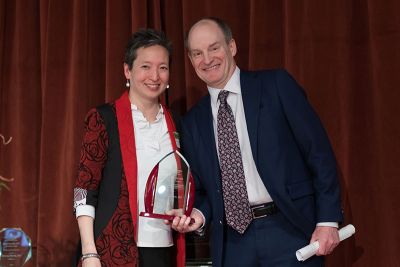
Dr. Ken Loving (right) accepts the John H. Renner Wisconsin Idea Award from DFMCH Executive Vice Chair Jennifer Edgoose, MD, MPH.
Dr. Ken Loving is the Chief Executive Officer of Access Community Health Centers, a Federally Qualified Health Center (FQHC) in Madison, and though his career path was not always certain, a lifelong desire to help others was influenced by his minister father and teacher mother. Despite studying geology, journalism, and English literature, it was a single day at a community health center in Chicago’s Humboldt Park neighborhood that set the course for his career.
Loving’s commitment to service led him to spend a year in Mexico volunteering and learning Spanish. In 1996, he moved to Madison with his wife Dr. Sarina Schrager and began working as a full-time physician at what was then the Madison Community Health Center. A collaboration with the DFMCH led to the opening of the South Madison Health and Family Center, also known as Harambee, Swahili for “Pulling Together.”
“In all parts of the country to differing degrees, people face barriers to accessing the health care that they need. FQHCs are designed to eliminate those barriers,” he said.
Access has a sliding fee program to make care affordable for the uninsured and underinsured and is in a neighborhood where many patients live to address transportation issues. They also offer medications at steeply reduced costs.
To build trust in the community, Access hires bilingual employees and uses interpreters to ensure robust language access.
“We’ve learned over the years that trust is the biggest barrier,” Loving added.
Access’s model of care is another way they’ve built trust. They provide a variety of services, developing a unique model of integrative care. They began dental services at the southside location after becoming an FQHC in 2002. Now, there are a total of 54 operatories with two clinics in Madison, one in Sun Prairie, another in Dodgeville, and a mobile dental practice.
Another aspect of their care model is called Primary Care Behavioral Health where behavioral health consultants practice alongside medical providers. The model has received national recognition.
Despite the economic progress and regular innovations in healthcare in the community, health disparities in Dane County remain. However, Access has expanded its population health efforts to focus on these disparities. They’ve forged a partnership with Exact Sciences to make it easier for uninsured patients to get screened for colorectal cancer and are focusing on hypertension.
Currently, Access is working closely with the Foundation for Black Women’s Wellness on the Saving Our Babies initiative. They hope to expand the model to other communities where birth outcome disparities exist.
“One of the challenges of the work that we do is that it’s never done, but the possibilities, too, are endless. Together I look forward to building improved models of care, expanding our work in the community, training the healthcare providers of the future, and building a more equitable place to live,” Loving concluded.
Hansen Lecturer: Nicole Bonk, MD
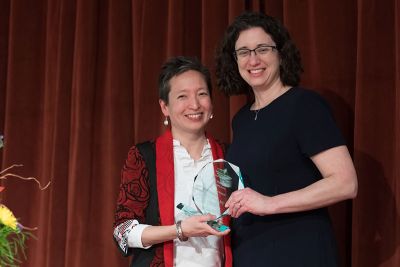
Dr. Nicole Bonk (right) with Dr. Jennifer Edgoose. Bonk gave this year’s Marc Hansen Lecture.
Dr. Nicole Bonk’s excellence in medical education earned her the honor of delivering this year’s Marc Hansen Lecture. In her introduction, Edgoose praised Bonk’s leadership roles throughout UW Health and her efforts to advance hospitalist medicine through scholarship.
Comparing her career to the Alice in Wonderland quote, “Would you tell me please, which way I ought to go from here?”, Bonk acknowledged her circuitous career path as she discussed what led her to hospital medicine.
After completing her residency at DFMCH in 2012, Bonk worked in urgent care and eventually became an attending physician on the inpatient family medicine teaching service at UW Hospital. She took over the inpatient medical directorship at East Madison Hospital and is currently the vice chief for clinical operations for hospital medicine.
Bonk is most proud of the opportunities she’s had to build relationships between the DFMCH and hospital medicine including options for residents and fellows to pick up inpatient work.
“I’m proud to say that we now have six of our family docs in hybrid roles with three doing primarily hospital medicine,” shared Bonk.
Raised by a small business owner and teacher, Bonk appreciated the way her father cared about the people who worked for him and found jobs where they could thrive. This people-centered approach had an impact on Bonk, and she has always tried to build strong relationships throughout her career. The importance of this type of collaboration was highlighted during the pandemic.
“This department stepped up in an incredible way during the pandemic. Our hospitals experienced significant fluctuations in patients, and I never felt like we were staffed in an unsafe way, and I think this department is to thank for that,” Bonk added.
As her curvy path continues, Bonk is thrilled that the latest turn includes a new Home-Based Hospital Care Program launched in July 2023. Eligible patients receive a physician visit at home at least once a day, nurse visits at least twice a day while there is always a physician and nurse on call. Bonk shared that the program recently accepted its first uninsured patient to advance equity.
“I really think all of this, especially that time during the pandemic, comes back to relationships. The people in this department are just so incredible,” she concluded.
The evening closed with the presentation of several other honors for excellence in service, quality improvement and research.
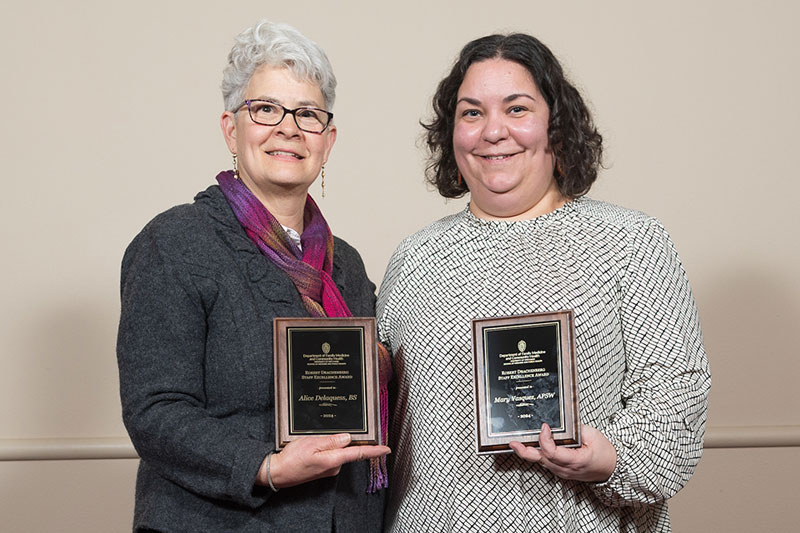
Robert Drachenberg Staff Excellence Awards: Alice Delaquess, BS (left), Mary Vasquez, APSW (right). Not pictured: Brenda Hahn, CMA.
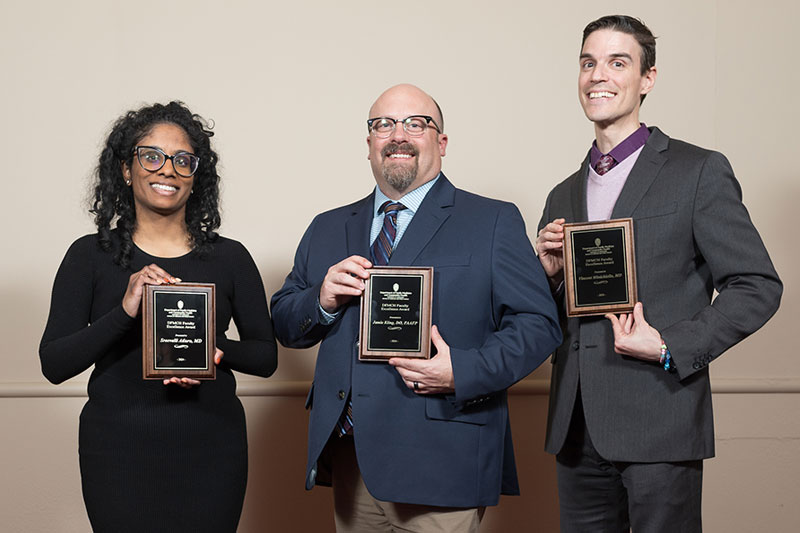
DFMCH Faculty Excellence Awards: from left, Sreevalli Atluru, MD, Jamie Kling, DO, FAAFP, Vincent Minichiello, MD.
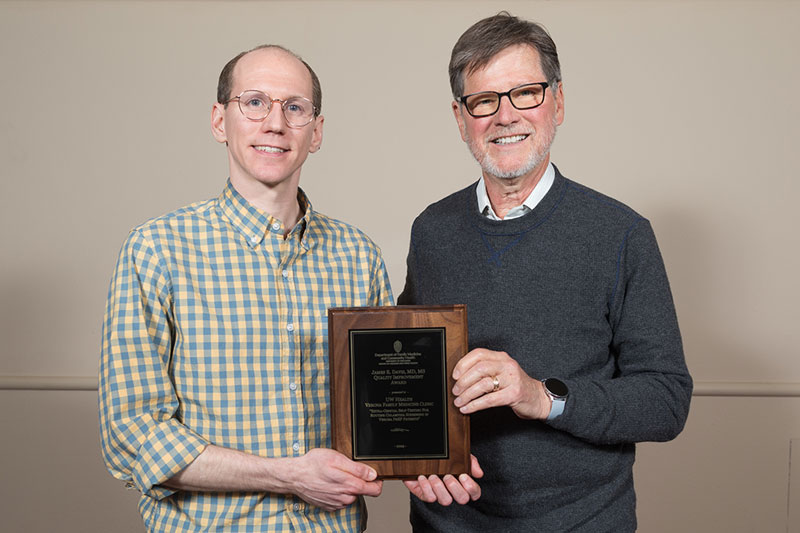
James Davis, MD, MS, Quality Improvement Award: UW Health Verona Family Medicine Clinic (Dr. Hallum Dickens, left, accepts the award on behalf of Verona clinic from Dr. Davis).
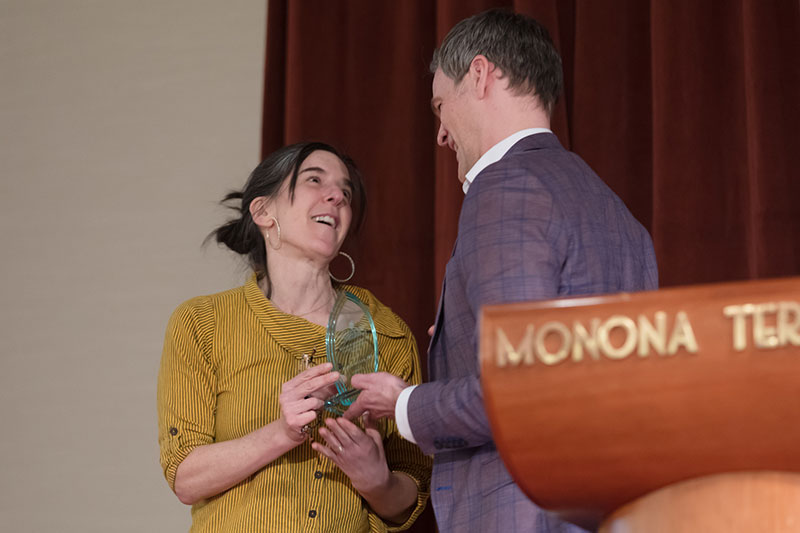
Richard Roberts, MD, JD, Clinical Excellence Award: Alison Miller, DO.
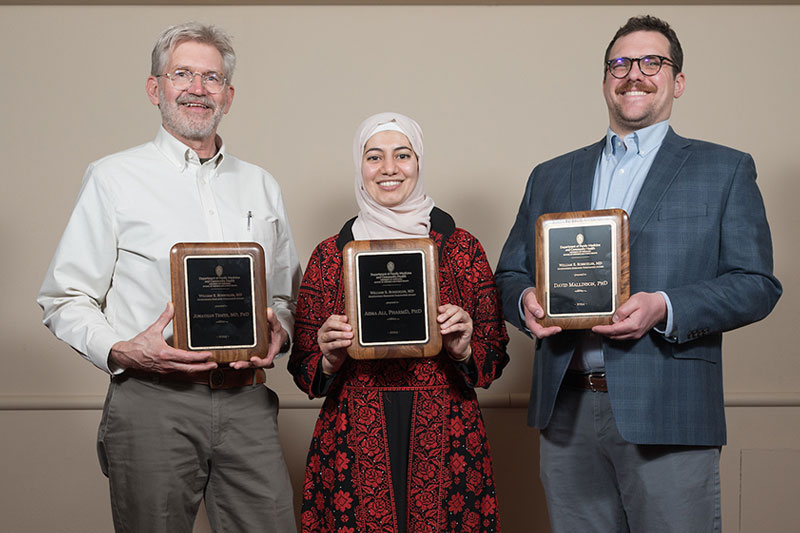
William Scheckler, MD, Research Awards: from left, Jonathan Temte, MD, PhD, MS, Asma Ali, PharmD, PhD, David Mallinson, PhD.
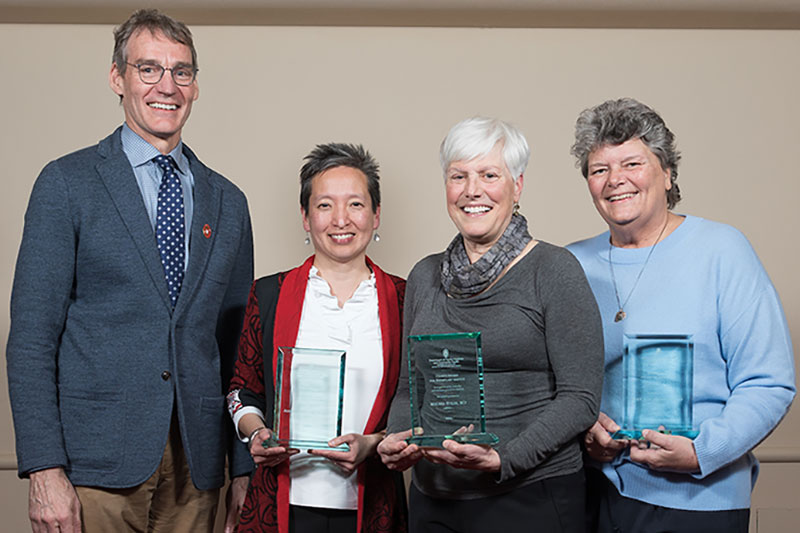
Chair’s Awards: from left, Chair David Rakel, MD; Jennifer Edgoose, MD, MPH; Melissa Stiles, MD; Virginia Snyder, PhD, PA-C.
More Event Photos
On Facebook: https://www.facebook.com/wifamilymedicine/posts/1029470808562746
Published: March 2024
